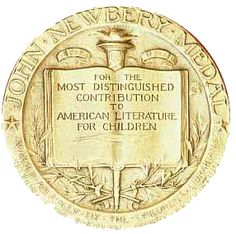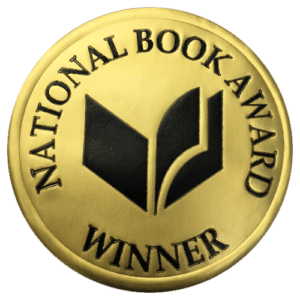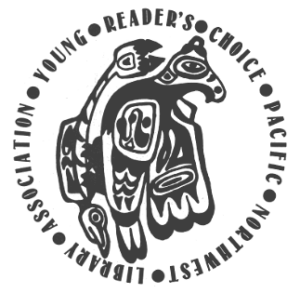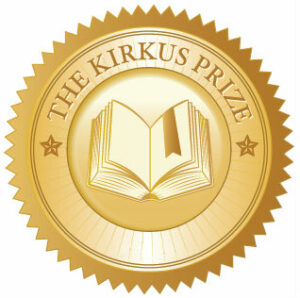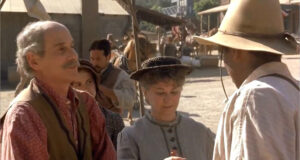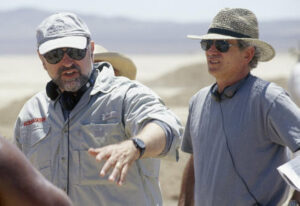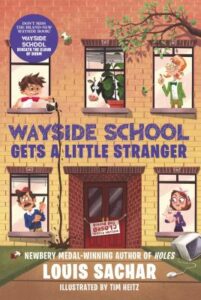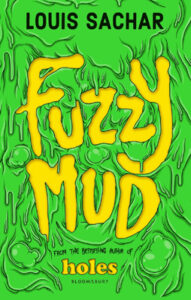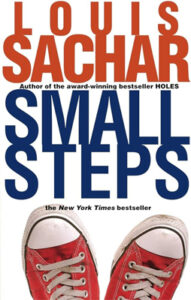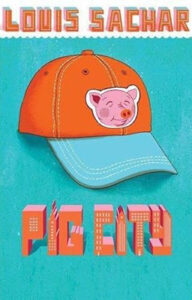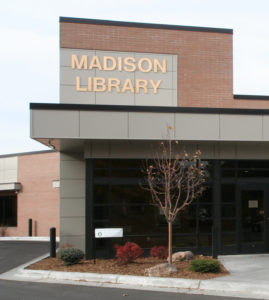On the Same Page
Reader’s Guide
Holes
► Louis Sacher
► Hillside Elementary School
► Holes
► Adaptations
► Yellow-Spotted Lizards
► Other Works
► Questions for Discussion
► Back to On the Same Page Home
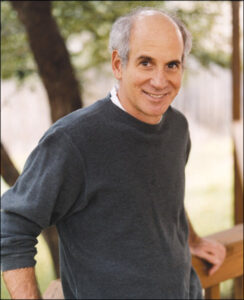 Louis Sacher
Louis Sacher
(March 20, 1954)
Louis Sachar was the second of two sons born to Robert J Sachar and Ruth Raybin Sachar on March 20, 1954. He and his older brother, Andy, were close, and it was Andy who encouraged Louis’s writing.
The Sachar family was devoutly Jewish and Louis attended Hebrew school where his family lived in East Meadow, New York.
When he was nine, the family moved to Tustin, California.
After high school, he attended Antioch College, a private liberal arts college in Ohio. He left after one semester when his father unexpectedly died and returned to Tustin to be with his mother.
 He later attended the University of California at Berkeley where he majored in economics. While there, he noticed a little girl handing out flyers and took one. The flyer asked for volunteers at a local elementary school and noted that the position would give three college credits.
He later attended the University of California at Berkeley where he majored in economics. While there, he noticed a little girl handing out flyers and took one. The flyer asked for volunteers at a local elementary school and noted that the position would give three college credits.
“I thought it over and decided it was a pretty good deal. College credits, no homework, no term papers, no test, all I had to do was help out in a second/third grade class at Hillside Elementary School. Besides helping out in a classroom, I also became the noontime supervisor, or “Louis, the Yard Teacher” as I was known to the kids. It became my favorite college class, and a life changing experience.”
Sachar finished his economics degree in 1976 and began writing Sideways Stories from the Wayside School which was published in 1978. Although he used many of the names of the children at Hillside Elementary, he emphatically states that none of the stories actually happened.
 Sideways Stories didn’t attract much attention initially, so Sachar entered UC’s Hastings College of Law, graduating in 1980. He worked as a lawyer but continued to write part time until 1989 when his books were selling well enough to justify him becoming a full-time author.
Sideways Stories didn’t attract much attention initially, so Sachar entered UC’s Hastings College of Law, graduating in 1980. He worked as a lawyer but continued to write part time until 1989 when his books were selling well enough to justify him becoming a full-time author.
During his half lawyer – half writer phase, Louis married Carla Askew, an elementary school counselor. They had a daughter, Sherre, in 1987. Sachar has said that his wife was the inspiration for the counselor in There’s a Boy in the Girl’s Bathroom and Stanley’s lawyer in Holes.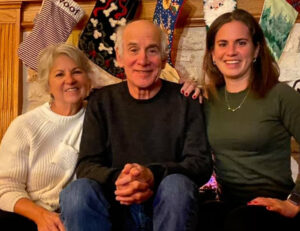
Hillside Elementary School
Louis Sachar claims that he would never have begun writing children’s books without the inspiration from his time and experiences at Hillside Elementary. 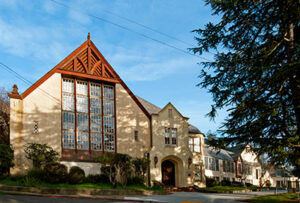 The Hillside School is a former elementary school in the Berkeley foothills listed on the U. S. National Register of Historic Places. It first opened in 1901, but was destroyed the 1923 Berkeley fire. The current structure was completed in 1925 and designed by prominent architect Walter H. Ratliff in the Tudor Revival style.
The Hillside School is a former elementary school in the Berkeley foothills listed on the U. S. National Register of Historic Places. It first opened in 1901, but was destroyed the 1923 Berkeley fire. The current structure was completed in 1925 and designed by prominent architect Walter H. Ratliff in the Tudor Revival style.
A seismic retrofit was done in the 1930s and an additional wing added in in 1964.
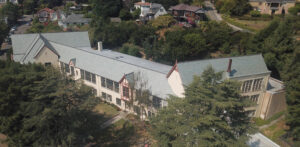 In the late 1960s, the school was limited to Kindergarten through third grade, and would have been such when Louis Sachar did his volunteer work there.
In the late 1960s, the school was limited to Kindergarten through third grade, and would have been such when Louis Sachar did his volunteer work there.
By 1983, because of declining school age population in the area and because it was noted that the structure was sitting of the Hayward Fault, the school was closed. During the next years, the space was leased by the Berkeley Montessori School and the Berkeley Chess School.
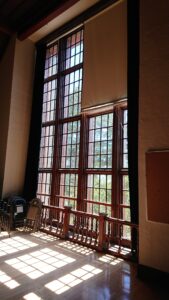 In 2012, the school district sold the building to the German International School of Silicon Valley which did significant restoration work. Six years later, the German school sold Hillside to a Finnish businessman who intended to use it as artists’ studios.
In 2012, the school district sold the building to the German International School of Silicon Valley which did significant restoration work. Six years later, the German school sold Hillside to a Finnish businessman who intended to use it as artists’ studios.
Residents of the area have also used Hillside’s playground, where Louis the yard teacher reigned, as a neighborhood park with clear pedestrian parkways leading to it. When the rumors of sale began, residents proposed a special assessment district to purchase that portion of the site.
Holes
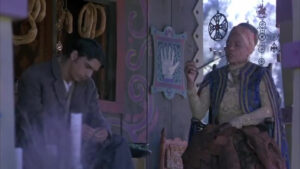 Louis Sachar’s 1998 novel Holes is much darker than any of Sachar’s other books. The tale is rich with historical sub-plots that give depth and meaning to the present-day story. The tales of Stanley and Hector’s ancestors help to explain their current predicaments and the contemporary actions resolve the problems of the past.
Louis Sachar’s 1998 novel Holes is much darker than any of Sachar’s other books. The tale is rich with historical sub-plots that give depth and meaning to the present-day story. The tales of Stanley and Hector’s ancestors help to explain their current predicaments and the contemporary actions resolve the problems of the past.
In an interview with Todd Miller, Sachar gave some insights into his creation of the book.
What inspired Holes?
I moved to Texas in 1991 from San Francisco. The summers in Texas are so long and so hot – working outside in the summer, just planting a tree, can be so miserable. Holes started as an outlet for my misery about the hot Texas summers.
What is it about Stanley Yelnats that kids can relate to?
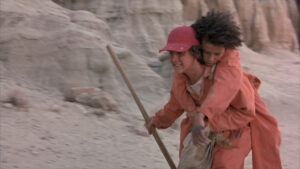 His plight. Anyone falsely accused of a crime immediately has your sympathy. I think all adolescents feel, in one way or another, that life has treated them unfairly. And then there’s his strength of character. Stanley’s the one who’s courageous enough to run away from Camp Green Lake, to save Zero, to come back and dig that one last hole. He finds the strength within himself to do all that. It’s his bearing up under it all that makes people like him.
His plight. Anyone falsely accused of a crime immediately has your sympathy. I think all adolescents feel, in one way or another, that life has treated them unfairly. And then there’s his strength of character. Stanley’s the one who’s courageous enough to run away from Camp Green Lake, to save Zero, to come back and dig that one last hole. He finds the strength within himself to do all that. It’s his bearing up under it all that makes people like him.
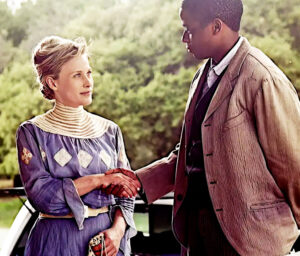 There are quite a few subplots in Holes: Zero’s story, which touches on the issue of homelessness, and the 19th-century interracial romance between Kissing Kate Barlow and Sam, the onion peddler.
There are quite a few subplots in Holes: Zero’s story, which touches on the issue of homelessness, and the 19th-century interracial romance between Kissing Kate Barlow and Sam, the onion peddler.
One of my favorite parts of Holes is the whole Kate Barlow/Sam story. I had come up with the idea that this famous outlaw, Kissing Kate Barlow, had buried this treasure. And when I needed some background on Kate Barlow, I just started making her story up. Suddenly, it became my favorite part of the book. It just took off.
Awards
The Newberry Medal
The National Book Award for Young People’s Literature
The Pacific Northwest Young Readers Choice Award
The New York Times Book Review Notable Children’s Book of the Year
American Library Association Best Book for Young Adults
Publishers Weekly Best Book of the Year
The Kirkus Prize, School Library Journal Best Book of the Year
It was the first book ever to win both the Newberry and National Book Award.
Adaptations
2003 FILM
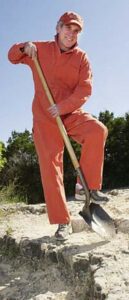 The best known Holes adaptation is undoubtedly the 2003 film directed by Andrew Davis for Disney.
The best known Holes adaptation is undoubtedly the 2003 film directed by Andrew Davis for Disney.
Davis, primarily known for big budget action films like The Fugitive, Under Siege, Collateral Damage, and Code of Silence, worked closely with Sachar who wrote the screenplay. Sachar liked the process. “I like adapting my own material because it stays true to the story and true to the feelings behind the story.”
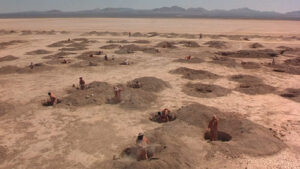 He also said, “Working with the actors was helpful–especially with the Madame Zeroni character. Once I’d heard the actress (Eartha Kitt), I made up more lines for her. I could hear the actress’s voice in my head as I was writing.
He also said, “Working with the actors was helpful–especially with the Madame Zeroni character. Once I’d heard the actress (Eartha Kitt), I made up more lines for her. I could hear the actress’s voice in my head as I was writing.
Special care was given to Zeroni’s song. “I wanted the ‘Pig Lullaby’ to sound like it was translated from an old, Eastern European song and that some elements were lost in translation, like the rhymes.”
Sachar was on the set every day of filming, working closely with Davis, and even had a cameo in old Green Lake.
THE STAGE PLAY
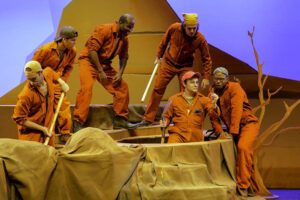 In 2002, the Seattle Children’s Theatre approached Sachar about adapting his novel into a play. He had just finished the screenplay and filming and felt like he was done with the story. However, the artistic director, Linda Hartzell, wouldn’t accept his “no.” She sent him an outline of what she thought the play would look like on stage. Sachar was so impressed that he agreed to adapt one more time.
In 2002, the Seattle Children’s Theatre approached Sachar about adapting his novel into a play. He had just finished the screenplay and filming and felt like he was done with the story. However, the artistic director, Linda Hartzell, wouldn’t accept his “no.” She sent him an outline of what she thought the play would look like on stage. Sachar was so impressed that he agreed to adapt one more time.
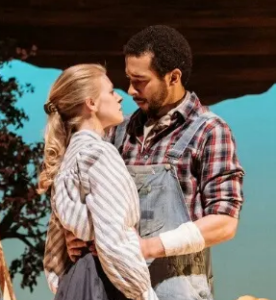 “Once I decided to do the play, I had that structure in mind. I thought that it would be more fun to have it all happening at the same time–so that, while the boys dig, we see things that happened a hundred years ago.”
“Once I decided to do the play, I had that structure in mind. I thought that it would be more fun to have it all happening at the same time–so that, while the boys dig, we see things that happened a hundred years ago.”
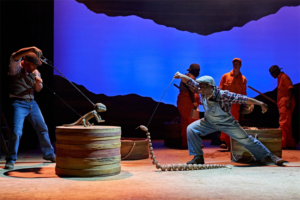 The play received an award from the Kennedy Center Fund for New American Plays and an OnStage Award from the Theatre Communications Group.
The play received an award from the Kennedy Center Fund for New American Plays and an OnStage Award from the Theatre Communications Group.
OTHER ADAPTATIONS
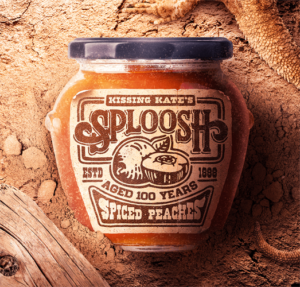 While Kissing Kate’s Sploosh had a very limited run, there are dozens of spiced peach offerings currently available to order.
While Kissing Kate’s Sploosh had a very limited run, there are dozens of spiced peach offerings currently available to order.
Yellow-Spotted Lizards
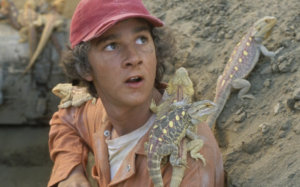 One of the greatest terrors of Camp Green Lake are the yellow-spotted lizards. Aggressive and lethal, one bite is a sure and horrible death sentence.
One of the greatest terrors of Camp Green Lake are the yellow-spotted lizards. Aggressive and lethal, one bite is a sure and horrible death sentence.
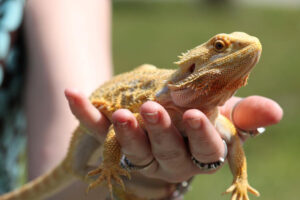 The good news is, that yellow-spotted lizards live only in the dry bed of the imaginary Green Lake. If you’ve seen the film adaptation of the book, the terrifying creatures were really bearded dragon lizards with spots painted on. Bearded dragons are fairly docile and often kept as pets. Some owners even have a harness and leash to take them for walks.
The good news is, that yellow-spotted lizards live only in the dry bed of the imaginary Green Lake. If you’ve seen the film adaptation of the book, the terrifying creatures were really bearded dragon lizards with spots painted on. Bearded dragons are fairly docile and often kept as pets. Some owners even have a harness and leash to take them for walks.
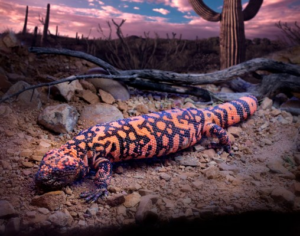 The only poisonous lizard in North America is the gila monster which lives in our southwest deserts. A gila monster’s bite is likely to cause swelling, nausea, and of course, extreme pain. Hospitalization is a good possibility, though instances of death are very rare. Still, best to stay away.
The only poisonous lizard in North America is the gila monster which lives in our southwest deserts. A gila monster’s bite is likely to cause swelling, nausea, and of course, extreme pain. Hospitalization is a good possibility, though instances of death are very rare. Still, best to stay away.
Other Works
Sideways Stories from Wayside School
Wayside School is Falling Down
Wayside School Gets a Little Stranger
Wayside School Beneath the Cloud of Doom
Marvin Redpost Series
Marvin Redpost: Kidnapped at Birth?
Marvin Redpost: Why Pick on Me?
Marvin Redpost: Is He a Girl? 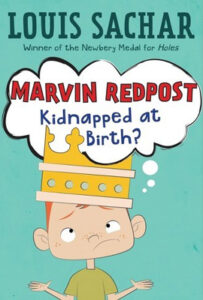
Marvin Redpost: Alone in His Teacher’s House
Marvin Redpost: Class President
Marvin Redpost: A Flying Birthday Cake?
Marvin Redpost: Super Fast, Out of Control
Marvin Redpost: A Magic Crystal?
Best of Friends: Sixth Grade
Dogs Don’t Tell Jokes
Johnny’s in the Basement
Monkey Soup
Pig City
Sideways Arithmetic from Wayside School
More Sideways Arithmetic from Wayside School
Small Steps
Someday Angeline
Stanley Yelnats Guide to Survival
The Boy Who Lost His Face
The Cardturner
QUESTIONS FOR DISCUSSION
-
- Why the title Holes? What holes are in Stanley’s life when he first arrives at Camp Green Lake?
- Why do the boys resort to nicknames? What do these nicknames say about them? Do you think a name changes the way other people see a person? What would your Camp Green Lake nickname be and why?
- How does Stanley and Zero’s relationship parallel other relationships in the book?
- Holes is really three stories. Which speaks the most to you? Why? Can any of these stories stand without the others?
- Is there significance to Stanley Yelnats being a palindrome?
- Holes was the first book to win both the Newberry Medal and the National Book Award for Young People’s Literature. Why do you think that happened?
- If you have seen the film Holes, how does it compare to the book? Which do you prefer?
- Does it seem like Sam is a respected member of Green Lake? Why or why not? Were you surprised to see the community turn on Kate and Sam?
- How does Stanley and Zero’s relationship change throughout the novel? Do you feel one of them initiates that change more? Is there a moment when the tides turn?
- Stanley’s father says, “I learn from failure.” What does this mean? Is there a time that you learned from failure?
- Before going to Camp Green Lake, Zero is homeless. How does your community deal with homelessness?
- Stanley and his family blame their misfortunes on Stanley’s “no-good-dirty-rotten-pig-stealing great-great grandfather.” Does your family have any stories that have been passed down through generations?
- How does Stanley find the strength to carry Zero up the mountain even though he didn’t know what he would find at the top? Describe something you’ve done that seemed impossible. What did you learn from the experience?
- How does Stanley find the strength to carry Zero up the mountain even though he didn’t know what he would find at the top? Describe something you’ve done that seemed impossible. What did you learn from the experience?
- Even though his fate is uncertain, Stanley is suddenly very happy as he lies awake on the top of the mountain. Why? How has his life changed from the start of the story.
- When Hattie Parker sees Katherine and Sam kiss, she says, “God will punish you!” Based on events later in the book, whom do you think was really punished?
- Discuss the symbolism of:
Holes — Onions — Spiced Peaches — God’s Thumb — Yellow Spotted Lizards
- If you have read any of Sachar’s other books, how does Holes compare?
Download the Reader’s Guide
(PDF Download)
Regular Hours of Operation
- Monday: 9:00 am – 6:00 pm
- Tuesday - Wednesday: 9:00 am – 8:00 pm
- Thursday: 11:00 am – 8:00 pm
- Friday: 10:00 am – 6:00 pm
- Saturday: 10:00 am – 2:00 pm
- Sunday: CLOSED
Closures in 2025
- January 1 – New Year’s Day
- January 20 – Martin Luther King, Jr., Day
- February 17 – Presidents Day
- March 28 – Staff Development Day
- April 5 – Building Maintenance
- May 24-26 – Memorial Day
- June 19 – Juneteenth
- July 4 – Independence Day
- August 30-September 1 – Labor Day
- September 19 – Staff Development Day
- October 4 – Building Maintenance
- October 31 – Open from 9:00 am to 6:00 pm
- November 11 – Veterans Day
- November 26 – Closing at 5:00 pm
- November 27-29 – Thanksgiving
- December 24-26 – Christmas
- December 31 – New Year’s Eve
- January 1, 2026 – New Year’s Day
Address
73 North Center
Rexburg, Idaho 83440
We are located on Center Street, just north of Main Street, by the Historic Rexburg Tabernacle.
Contact Us
(208) 356-3461
24 Hour Phone Renewal: (208) 356-6658
askmadisonlibrary@madisonlib.org

